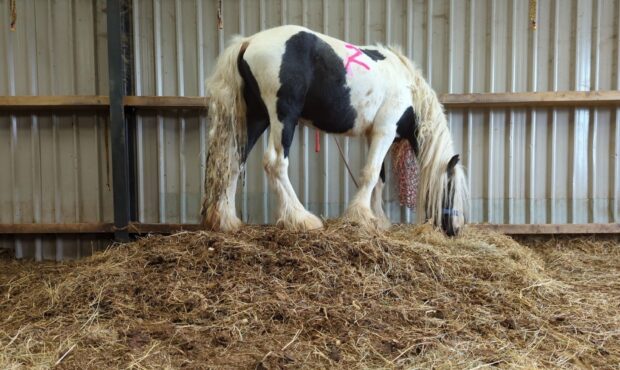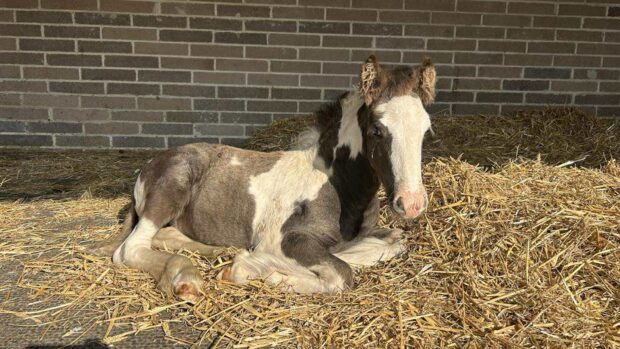A woman who failed to get vet treatment for a seriously ill and underweight foal left tethered without food, water and shelter has been banned from keeping animals for 10 years and given a suspended prison sentence.
Months-old colt Cricket was seized by police but despite vets’ efforts, had to be put down to end his suffering, the RSPCA said. Carol Summers, a 60-year-old from Foss Walk, Castleford, admitted causing unnecessary suffering and failing to meet the horse’s needs.
A spokesman for the charity said the foal, thought to be six to eight months old, was found in a field in Castleford, West Yorkshire, on 13 January this year after welfare concerns had been reported to the RSPCA.
At a sentencing hearing on 6 December, Kirklees magistrates heard that RSPCA inspector Kris Walker had visited the field and seen multiple tethered horses but “one in particular raised concern”.
In a statement to the court, Mr Walker said: “I saw a tethered young colt. He did not look any older than eight to 10 months old. He was lethargic, wobbly on his feet and very thin with his hips and spine all prominent. The rug he was wearing was too big for him and not on properly. He was scouring badly. There was no food, water or shelter readily available for him and he should not have been tethered due to his young age.”
A vet gave Cricket a body score of one out of nine and said he was suffering from dehydration, hyperthermia and diarrhoea and needed urgent veterinary care, the RSPCA said, adding that police took in the foal, and he was taken for treatment.
“He was so thirsty as he was taken up the road that he drank from the nearest puddle,” an RSPCA spokesman said.

“Summers then arrived on the scene and was told Cricket had been seized by the police because he was suffering and an investigation would be started. At that point she agreed to sign him over into the care of the RSPCA, telling inspector Walker she’d owned the foal for six weeks and had been given steroids by a vet to treat him, although no record of this was found.”
Cricket was taken to nearby vets, then transferred to an equine hospital.
A vet who gave evidence as part of the case said: “There was no shelter available for the foal and no water was provided. Overall, this was not a suitable place for the foal to be tethered, nor was the foal of suitable age for tethering. Cricket should have been provided with ad-libitum water, especially given that he was sick with diarrhoea and so had a higher demand for water intake.
“He was too young to be tethered and also not appropriately tethered as he was tethered connected to a fabric headcollar which poses a serious risk of injury. The Defra code of practice clearly states horses under the age of two years old should not be tethered.”
Another vet who gave evidence said Cricket was emaciated and estimated to weigh 85kg (187 pounds) when he was found.
“This is severely underweight for a cob colt foal of six to eight months old,” she said. “At this age, the foal should be approximately 40 to 50% of its adult weight. A cob of 13hh to 14hh will weigh between 300 – 400 kg respectively. This foal should have weighed approximately 150 kg, demonstrating how severely underweight he was.”
Despite extensive treatment and care, Cricket’s condition did not improve in the following weeks and “a vet made the decision that it was in his best interest to put him to sleep to prevent further suffering”, the RSPCA said.
“The court heard that despite Summers telling the RSPCA inspector she had owned Cricket for six weeks, she later disputed this and said it had only been three. However, she agreed she had assumed ownership and had failed to get the foal the care he needed and he had suffered unnecessarily as a result.”
As well as the suspended 16-week prison sentence and the 10-year ban, Summers was ordered to complete 15 rehabilitation activity requirement days and pay costs of £400 and a victim surcharge of £154. She will not be able to appeal her ban for the next five years.
“Magistrates said Cricket’s basic needs had not been met and there was a failure by the defendant in all aspects of horse ownership,” the RSPCA said. “In mitigation they heard Summers had various caring responsibilities and accepted she should never have become involved in looking after the foal.”
You might also be interested in:

Horse found tangled in barbed wire prompts advice to owner

Stallion with maggots ‘tunnelling’ into leg ulcers put down: owner’s appeal dismissed

Subscribe to Horse & Hound magazine today – and enjoy unlimited website access all year round
Horse & Hound magazine, out every Thursday, is packed with all the latest news and reports, as well as interviews, specials, nostalgia, vet and training advice. Find how you can enjoy the magazine delivered to your door every week, plus options to upgrade your subscription to access our online service that brings you breaking news and reports as well as other benefits.




